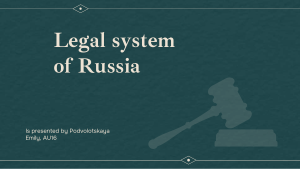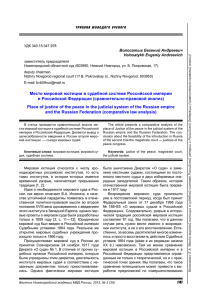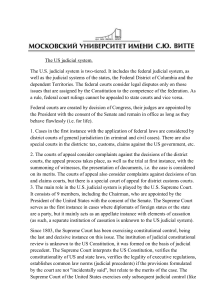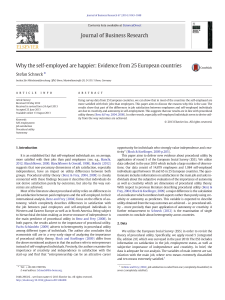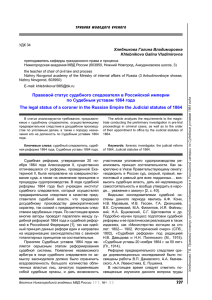
Практика 1 1.Понятие и предмет International Civil procedure (IHL)1 is a set of procedural rules which regulates the procedure of considering civil law disputes related to the rule of law of two or more States. The term IHL is conditional in nature - the word "international" has the same meaning as in private international law (IHL): it means that there is a legal connection in private law with a foreign legal order. "International" in international procedural law is not its interstate nature, but the goals (tasks) which are set before this law. IHL has the same features as the national civil procedure: it is aimed at protecting or challenging (disputing) civil rights, has a public law character and is associated with the realization of the powers of State bodies. IHL is a form of realization of civil rights, which is implemented as a public legal relationship. The doctrine is dominated by the point of view according to which international civil procedural law (as well as procedural law in general) is part of public law: "Procedural law has its roots in public law, and therefore it is particularly strongly influenced by the principle of "state sovereignty". This public nature of the procedural law explains the limitations of the freedom that litigants use." However, civil proceedings are not always characterized by relations of power and subordination between the court and the participants in the process. The general method of regulation peculiar to private law plays an important role in civil proceedings: the right to speak in the process on one's own behalf, but in defense of other people's interests; numerous aspects of evidentiary law; distribution of the burden of proof. Like private law, civil procedure protects the rights and interests of participants in civil turnover. The civil process pursues private legal goals, using public legal means. From these positions, civil procedure is difficult to attribute to public or private law; it is an independent legal category. The problems of defining the subject of IHL are elaborated in detail in the doctrine of law: IHL combines the norms of international law, the procedural law of individual countries and the case law of international courts (the European Court of Human Rights, the Court of Justice of the EU) •There are two elements in IHL: 1) a set of norms regulating the relationship and interaction of jurisdictional bodies from different States considering cases involving foreign persons; 2) a set of norms regulating the interaction of national and international bodies that consider cases involving individuals and legal entities from different countries •The subject of IHL includes issues of international jurisdiction, the civil procedural status of foreigners (individuals, legal entities, etc.), judicial evidence, establishing the content of the law to be applied, foreign court orders, recognition and enforcement of foreign judicial decisions and foreign administrative acts on the personal status of citizens, recognition and enforcement of foreign arbitral awards, the legal significance of the proceedings in this case, brought in a foreign court, and unfinished. IHL can be defined as a public law regulated by national legislation and international treaties of State courts in the setting of justice in cross-border civil cases, which are of an extraterritorial nature and aimed at resolving crossborder disputes, as well as other issues of a private legal nature. Norms IHL is aimed at regulating civil procedural relations related to foreign law and order. In the subject IHL includes the following issues: 1) International civil procedure jurisdiction; 2) the civil procedural status of foreign persons (physical and legal), a foreign state, and international organizations; 3) judicial evidence in cases related to foreign law and order; 4) the decision on the applicable law; 5) establishment of the content, interpretation and application of foreign law; 6) taking interim measures; 7) provision of international legal assistance, execution of foreign court orders; 8) recognition and enforcement of foreign judicial decisions; 9) recognition and enforcement of foreign arbitration decisions. International civil procedure is an independent part of private international law, is included in its structure and forms a separate branch in it. Procedural problems are most closely related to the issues of determining the applicable law and the civil legal capacity of individuals. IPL and IHL have a common origin, close interaction and interdependence. In both cases, the aim is to make foreign law acceptable to local law enforcement. Like the IPL, IHL has a dual character: a connection with a foreign legal order requires the participation of foreign state authorities in the process, assumes a special role of international legal norms. 3. Принципы. The principles of international civil procedure represent the main ideas underlying the regulation of transnational civil procedural relations. The basic principles of civil procedure include: legality, dispositivity, adversarial nature, material (judicial) truth, the right to judicial protection, the effectiveness of legal remedies, independence and impartiality of the court, procedural equality of the parties, transparency and oral proceedings, its continuity and immediacy. According to Article 398 of the CPC of the Russian Federation, it follows that all the basic principles contained in the norms of national civil procedure legislation apply to judicial proceedings related to foreign law and order. Because IHL as a whole has a public legal nature, then it is influenced by the principles of public international law: universal respect for human rights and fundamental freedoms, conscientious fulfillment of international obligations, sovereign equality of States, judicial immunity of the State, its diplomatic and consular representatives. The general principles of IHL are the principles of the national civil process, based on the general principles of law and consistent in most legal systems. The principles of judicial proceedings are generally universal, regardless of whether the proceedings are of a national or "cross-border" nature. Nevertheless, a number of the most significant principles can be identified for IHL, given the connection of the dispute with the foreign legal order and the need for special approaches to resolving such a category of cases. IHL is based on ensuring a balance national and public interests (taking into account the presence of a foreign element), the independence of the judicial system and judicial decisions in relation to the foreign policy of the state, the correlation of national procedural norms with international public law. Principles of the transnational civil procedure of ALI/Unidroit reflects the trend of universalization of the "procedural"component of IHL and convergence of different legal systems in terms of requirements for a fair trial. Such universal principles include, in particular: independence, impartiality and competence of the court (Principle 1), procedural equality of the parties (Principle 3), due notice and the right to present their explanations (Principle 5); free administration of justice (Principle 7), dispositivity (Principle 10); judicial management of the process (Principle 14); publicity of legal proceedings (Principle 20). In addition, the principles of cross-border civil procedure include the immediate enforcement of court decisions, competition of jurisdictions and prejudice, recognition of court decisions and acts on the removal of interim measures, international jurisdictional cooperation. A number of special principles can be identified in IHL, which are relevant only for civil proceedings in disputes related to foreign law and order. Many special principles of IHL coincide with similar special principles of the IHL. They are partially fixed by law and quite fully studied in detail in the doctrine. The allocation of an approximate (non-exhaustive) list of special principles makes it possible to separate IHL from national civil procedure law and include it in the IPL system. The principle of equality of judicial processes of States as a branch principle of IHL is compared with the coherent principles of international law (jus cogens) sovereign equality and cooperation of States. It is assumed that procedural actions committed by a court of one State will have legal consequences on the territory of another State. Action of this principle is primarily aimed at improving the protection of the rights of foreign persons in civil proceedings. Provisions on equality of lawsuits and reciprocity are contained in many international agreements (Article 18 of the New York Convention on the Recovery of Alimony Abroad (1956), Article 8 of the Bruce Rural Convention on Certain Rules Relating to Civil Jurisdiction on the Issue of Collisions (1952)). In Russia, the principle of equality of judicial processes of States is not normatively fixed.
